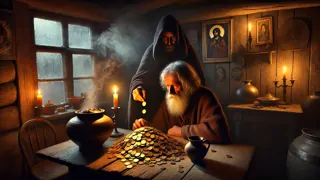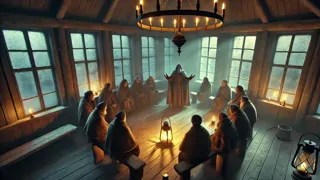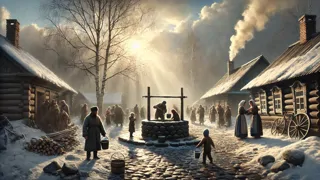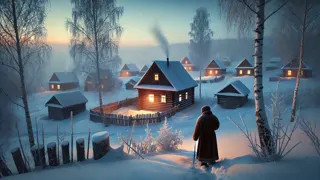Introduction
When the snow falls thick and silent across northern Russia, time seems suspended; life becomes a tapestry stitched from uncertainty, hope, and the hush of the wind. Far from the reach of czarist decree and the din of bustling cities, atop a gentle hill bordered by skeletal birches and quiet blue-frozen lakes, lies the village of Pravdino. Old log houses huddle together under sagging roofs, the scent of birch smoke curling in the air as hens cluck lazily in snowy yards. Here, folk rise with the crows and rest with the dusk, their days defined by the rhythm of the land—devout, proud, and bound by traditions that linger like the frost.
At the heart of Pravdino lives Master Mikhail, a man whose wisdom threads the community like a warm woolen scarf. Neither priest nor tsar’s man, but a craftsman, teacher, and silent judge, Mikhail has lived the length of his sixty years tending not only to wood and stone, but to the village’s tangled needs. With a gentle word or patient ear, he has mended disputes, guided orphans, and steered fools from ruin. His name draws respect from even the drunkest lout at the tavern. Yet it is not fame that defines him, but the quiet integrity for which he is loved—the unfailing fairness, the steady gaze that pierces deceit, and a kindness ruthless in its honesty.
There had always been tales whispered in Pravdino—stories of wily foxes, wandering spirits, and cunning men undone by hubris. Yet even in a world accosted by midnight wolves and long winters, few expected true evil to knock at their own doors. Until the day a stranger arrived in Pravdino, swathed in sable and shadow, bearing promises that glittered like sun on hoarfrost. He came when the winter was at its deepest, when hope for spring seemed but a memory and need gnawed circles in every stomach.
This is the story of the trial that would befall Master Mikhail—a story of temptation at winter’s heart, of a wager laid quietly by the firelight, and of choices that echo longer than the snows. In the test between good and evil, even the smallest actions cast long shadows. And in a frozen Russian village, one man’s resolve would reveal whether goodness is a light the darkness can never truly consume.
The Stranger’s Offer
Master Mikhail woke to a silence that stung the ears. The fire in his hearth had waned, and the glass of his window—a rare luxury—showed a world rimed white and still. He dressed in his heavy tunic, buttoned a pair of woolen mittens, and with a sturdiness born of years, went out to check his shed. The air bit and nipped, but Mikhail smiled. Cold sharpened the mind, and he enjoyed the discipline it demanded.

By the edge of the path, a shape moved—a stranger, tall as a silver birch and cloaked in sable so black it seemed to swallow the daylight. No traveler passed this way without reason, and certainly not at winter’s meanest hour. With deliberate calm, Mikhail stepped forward, meeting the stranger’s pale eyes, which shimmered peculiarly, as if reflecting the snow itself.
"Good morning to you, master," the stranger intoned, his voice low and smooth. “Might a weary soul find warmth in your hearth?”
What could Mikhail do but nod? Hospitality, even to devils, was a law older than the czars. The stranger entered with a swirl of snow, and for a moment, Mikhail thought the air grew colder still. Over steaming tea, they sat in his small kitchen lit by trembling firelight. The visitor’s eyes roamed the room, settling on the icons of saints and the bundle of letters atop a shelf. The talk ran from the price of salt to the hunting of wolves, but never strayed toward the stranger’s purpose.
It was not until the candles burned low that the stranger leaned forward, removing a pouch from beneath his coat. From it spilled gold. Not rubles, but bright coins stamped with foreign marks—so many that Mikhail’s table gleamed as if the sun itself had found its way indoors. “All this,” the stranger whispered, “for one small act.”
He explained: the village council would soon meet to decide whether to petition the district for a new well. The current one was dry and poisoned, causing sickness and fear. The stranger asked Mikhail to speak against the proposal, to call it a foolish expense and sow suspicion about its merits. He wanted dissension, delay, suffering—but offered enough gold to see Mikhail’s family and the village in comfort for years.
Mikhail’s gaze lingered on the coins. His mind flew to the sick children, to the scent of tainted water, to the old stories from his own mother—stories of neighbors who turned against each other in the face of scarcity. The stranger smiled, sensing the weight of the moment. “No one will suffer any more than they already do,” he crooned. “But you, revered master, will be honored. You desire nothing for yourself? Then let the gold serve the children, the hungry.”
The temptation was real—a solution to so many of Pravdino’s woes, bought for a few words. Yet as the shadows deepened, Mikhail’s heart tensed. He excused himself, feigning the need to fetch more tea, while inside he prayed—for wisdom, for strength, for the truth to speak clearly in the storm to come.
When Mikhail returned, he found the stranger watching the icons with almost mocking curiosity. As they parted for the night, the deal was left hanging. But already the poison of temptation began to wind its way through Mikhail’s sleep, coiling tighter with every icy gust that rattled the shutters.
The Trial of the Spirit
The following day, Pravdino buzzed in its own quiet way. Rumors curled like smoke: a stranger was in the master’s house, they said; gifts had crossed the doorstep; perhaps misfortune, or luck, was brewing. Folk watched Mikhail with wary respect, children peeping from behind snow-laden fences, elders muttering prayers behind frostbitten hands. Mikhail could feel the village’s eyes as if they were fingers tracing questions into his skin.

Yet of all the trials he had known—a mother’s grief, a neighbor’s betrayal, the gnawing absence of children long grown—this new fog of temptation pressed hardest. He could close his heart to greed, but to help the hungry, to mend the sick and the desperate, that had always been his life’s cause. Now gold waited on his table, only words away.
Mikhail thought of his father, who taught him the worth of honest labor. He thought of his late wife, the gentle sound of her laughter rising with the scent of baked rye and honey. Memory became armor as he prepared for the council’s evening meeting, the weight of the stranger’s offer echoing in his every step.
Dusk gathered above Pravdino; lanterns winked to life along the snow-packed lane. In the old assembly house, Mikhail seated himself in the circle of elders, faces lined and shadowed, their hands trembling as much from cold as from age. Before them, stacks of pale pine boards marked the old, failed well. The stranger stood among them, a subtle smile on his lips, watching Mikhail with a patience that turned the heart.
"We must act," said Anna the herbalist. “Another child fell ill. The water—”
Mikhail raised his voice. The room stilled. With terrible clarity, he understood that deciding against the well would lead to suspicion, delay, more sickness—and that the stranger’s coin could never clear his conscience or heal what lay broken inside him. Breathing slowly, he remembered his mother’s words: “The line between good and evil cuts through every heart.”
Instead of arguing against the well, Mikhail did the opposite. He condemned delay, demanded honesty, and warned of the cost of sowing discord for personal gain. He turned the council toward unity, urging not only immediate work but also mutual aid. The stranger’s eyes narrowed to cold slits. Mikhail’s heart battered his ribs, but his voice did not waver.
As the council voted, the room filled with hope—a candle against the vast Russian dark. Yet when the council broke, the stranger cornered Mikhail in an alley, his breath clouding in the night air. “So you fancy yourself a saint?” the man sneered. “Your goodness—will it fill bellies? Will it stop the cold?”
Mikhail shook his head. "Goodness fills emptiness, but not always as we expect. Evil is fast, like a sudden thaw; good weathers the winter with us."
The stranger’s face twisted into a rictus of rage and—was it sadness? "You could have saved them all," he spat. "At what cost?"
Mikhail’s faith wavered, but did not break. He walked home, the stranger’s shadow dogging his heels but finally fading beneath the trembling light of his window. That night, sleep came merciful in its silence, and though outside the wind howled, inside Master Mikhail felt at peace.
The Endurance of Goodness
In the days that followed, Pravdino labored together, hacking at the ice with borrowed shovels and axes, hauling logs and stone for the new well. Children sang as they fetched buckets, bundled tight in wool. Mother Anna mixed herbal brews to aid the ailing, and hope—fragile but real—began to pulse in the village’s frozen heart.

Master Mikhail played his part quietly. He refused to touch the stranger’s gold. At night, he tended the sick—sometimes with nothing but a word or the squeeze of an old hand. The temptation still gnawed: what lives could he have changed had he kept silent, let the stranger’s wishes slide into law, and poured coins where bread and medicine were needed? But if the soul was to be tended like a village, it could not be built on secrets or bargains with darkness.
Winter waned, and the well, sparkling in the pale spring sun, finally gushed clean water. That day, the village gathered, laughter brightening faces that had learned to live wary of hope. In their midst, Mikhail stood like a birch, proud but unbending.
The stranger did not return. Some whispered he’d been the devil himself. Others thought him only a man twisted by loss and wanting to make others share in his bitterness. Whatever his nature, the shadow he cast had slipped—like night before dawn.
One evening, alone beneath a sky brilliant with stars, Mikhail found the old pouch of gold beside his door, icy as death, the coins gleaming like judgment. He took it to the village’s edge, dug a hole beneath a solitary tree, and buried the treasure where even the roots might refuse it. Some wealth, he thought, is best left unfound.
Years later, when Mikhail’s bones rested beneath churchyard snow, stories of the trial lingered. Children heard how evil offered quick comfort, easy solutions, but left rot in its wake—while goodness endured, even if its fruits ripened slow as the Russian spring. And so, in Pravdino, when temptation came cloaked in black or brightened by gold, folk remembered Master Mikhail, who chose to feed hope over hunger and left the village stronger for his trial.
Conclusion
The tale of Master Mikhail etched itself not only onto the stones and wells of Pravdino, but in the memory of its people. Whenever storms gathered, or want threatened the fragile peace of the village, elders would recall the winter when evil wrapped itself in comforting words and golden offers. They reminded the young: it’s easy to be tempted when the world pinches your soul, but the path of good endures—even in loneliness, even in hunger—because it gives others more than coin ever could.
Mikhail’s greatest victory wasn’t the water that ran sweet in the well or the gold forever hidden in the earth. It was the unity he inspired, the strength he nurtured simply by refusing to betray his deeper self. The new well became a symbol of integrity: a reminder that though darkness may tempt with quick solutions and shining prizes, it’s the quiet, hard-won acts of goodness that truly last. In the years to come, when told beside hearths or sung in lullabies, Mikhail’s trial reminded all who listened that virtue, patient and persistent, is a candle no blizzard can fully snuff. For while evil allures, only good truly endures—bearing hope through the bitterest winters, withstanding the subtle torments of doubt, and lighting the way for those still learning to choose.


















